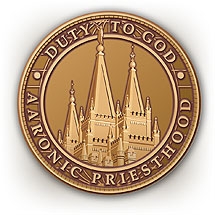The highest calling in the Aaronic Priesthood is that of a priest. In the Church of Jesus Christ of Latter-day Saints, or Mormon Church as it is more commonly known, young men at the age of sixteen (up through seventeen, or until ordained to the Melchizedek Priesthood) are ordained to the office of a priest upon being found worthy. If the young man has been a member of this Church for many years, the duties and responsibilities outlined in the Duty to God program will only add on to what he’s already accomplished as a deacon and teacher.
 Even as These goals vary in each area. In Family Activities there are ten goals in all, each of which must be completed and signed off by a parent. These goals may include reading the entire Book of Mormon, another testament of Christ, and discussing some of the main accounts, or perhaps the young man could talk to his parents about his career goals and his plans to achieve them.
Even as These goals vary in each area. In Family Activities there are ten goals in all, each of which must be completed and signed off by a parent. These goals may include reading the entire Book of Mormon, another testament of Christ, and discussing some of the main accounts, or perhaps the young man could talk to his parents about his career goals and his plans to achieve them.
The next area is Quorum Activities where seven goals must be completed under the guidance of a priesthood leader. Some of these goals include giving two 4-5 minutes talks each year when assigned by a leader, or to help teach at least two priest quorum lessons (a quorum is another name for the class). He could even learn the basic skills of conducting music and leading the music during a meeting.
Now we come to Personal Goals. Within this area are four new categories where eight goals must be completed in each one. The first category involves spiritual development, and is used to help strengthen testimonies, learn priesthood duties, and understand doctrines of the gospel. Some of these goals include speaking about the importance of honesty and integrity in daily life, participating in a baptism, and continuing to add to his missionary fund.
The next category deals with the young man’s physical development. It involves more than just physical activity, like running for 30 minutes 3 times a week. It also encourages him to learn teamwork perhaps by teaching the rules of a sport to another family or class member. He is also directed to practice safety by doing something such as studying the needs of people with disabilities, and planning and carrying out a camping trip (or other activity) that includes those with disabilities.
Next we look into educational, personal, and career development. All of these things can help to make a more confident, more self-reliant young man. Some of the goals included here involve obtaining part-time work (if he hasn’t already done so), obtaining a valid driver’s license (with parental approval), and participating in a church, school or community choir.
The last category looks at a young man’s citizenship and social development, particularly in helping him learn to serve others, improve his social skills, and becoming an involved member of the community. Some of these goals talk about personal hygiene, discussing good conduct in dating, or talking with a priesthood leader about different cultures where full-time missionaries are serving.
Each young man must also complete a Service Project to benefit his family or community. The priest is to plan it out, make any necessary preparations, and then carry out the project personally. These projects can double as Eagle Scout service projects for those who participate in both programs.
At last we come to keeping a Personal Journal. It probably sounds lame, but I can testify to the powerful influence of a journal. Not only is it a great record of your life, as well as spiritual impressions you may have forgotten, but it may become a treasure to your descendants.
If a young man has completed all the goals over the six years he attends the Young Men program in the Church, he is eligible to receive the Duty to God Award. Of course the real reward comes in every single wonderful trait and lesson he has learned over the last six years. These traits and lessons will continue to bless him as he moves on to become a missionary, a husband, and a father. I can testify of this.

